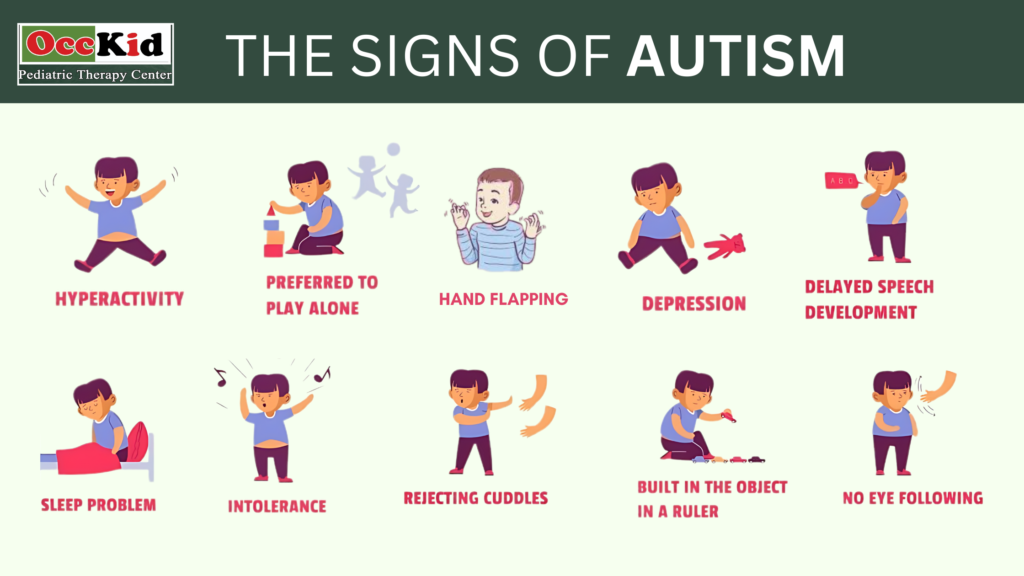Autism Spectrum Disorder (ASD) is a developmental condition that affects a child’s nervous system and overall growth. The first signs of autism typically appear within the first three years of life and can significantly impact a child’s social interactions, communication skills, and behavior. Many children with autism exhibit repetitive behaviors and have limited interests. Although autism is present from birth, it often becomes noticeable when a child begins struggling to interact with their peers.
What Causes Autism?
The exact causes of autism remain unknown, but research suggests a combination of genetic, environmental, and prenatal factors.
Genetic Factors
Genetic mutations may increase the likelihood of autism. While not all children with autism have genetic mutations, a family history of ASD can raise the risk.
Environmental Factors
Exposure to certain chemicals has been linked to a higher risk of developing ASD. These include:
- Air pollution
- Pesticides
- Bisphenol A (BPA)
- Phthalates
- Heavy metals such as mercury and lead
Nutritional Factors
Deficiencies in folic acid, vitamin D, and essential fatty acids may contribute to a higher risk of autism.
Infections During Pregnancy
A 2019 study found that maternal infections during pregnancy increase the likelihood of a child being diagnosed with autism by 79%.
Signs of Autism in Children
Autism manifests differently in each child, but common signs can be categorized into two main areas: social communication challenges and repetitive behaviors.
Social Communication and Interaction Challenges
- Difficulty maintaining eye contact or avoiding it altogether
- Delayed speech and language development
- Limited understanding of social cues and emotions
- Preference for solitary play over interacting with peers
- Speaking later than other children or not speaking at all
- Difficulty using speech in social settings
- Heightened or reduced sensitivity to sensory stimuli such as light, sound, touch, or taste
Repetitive Behaviors and Interests
- Engaging in repetitive movements like hand-flapping or rocking
- Insisting on strict routines and struggling with changes
- Intense focus on specific interests or objects, sometimes to the exclusion of other activities
- Sensory sensitivities, such as discomfort with loud noises or bright lights
- Repeating words or phrases (echolalia) or memorizing and reciting dialogue from TV shows or movies
- Lack of pointing with index finger

What to Do If You Notice These Signs?
Early intervention is crucial for helping autistic children thrive. If you suspect your child may be on the spectrum, seek a professional diagnosis as soon as possible.
Diagnosis Pathways
There are multiple ways to obtain a diagnosis for autism:
- Single Clinician Approach: A pediatrician, child psychologist, or psychiatrist can assess and diagnose ASD.
- Multidisciplinary Team: A group of healthcare professionals, including speech therapists and occupational therapists, work together to provide a comprehensive evaluation.
- Government-Funded Services: Many states offer publicly funded autism assessment services, though wait times may be long.
- Private Assessments: If immediate diagnosis is needed, private services can provide assessments more quickly.
Preparing for an Autism Assessment
To ensure an accurate diagnosis, document your child’s behaviors, concerns, and developmental history. Key professionals involved in assessments may include:
- Pediatricians
- Child and adolescent psychiatrists
- Psychologists
- Speech pathologists
- Occupational therapists (OTs)
- Social workers
Seeking the Right Support for Your Child
Receiving an autism diagnosis can be overwhelming, but the right support system can make a significant difference. Various therapies can help children develop essential life skills, such as:
- Positive Behavior Support (PBS) to encourage appropriate behaviors
- Incidental Teaching to promote learning through everyday activities
- Applied Behavior Analysis (ABA) to reinforce social and communication skills
Finding the Right Support Worker
When selecting a support worker, look for:
- Relevant qualifications and experience in working with autistic children
- Expertise in social skills development, behavioral support, or sensory integration
Take Action Today!
Autism is not a barrier to success—early intervention, therapy, and support can help your child reach their full potential. If you suspect your child might have autism, don’t wait. Seek guidance from specialists and take the first step towards ensuring a brighter future for your child.
For expert guidance, diagnosis, and therapy, visit Occkid Pediatric Therapy Center.
📍 Siddharth Nagar, Main Road, Berhampur 📞 Call us at 9853999128 to book an appointment!